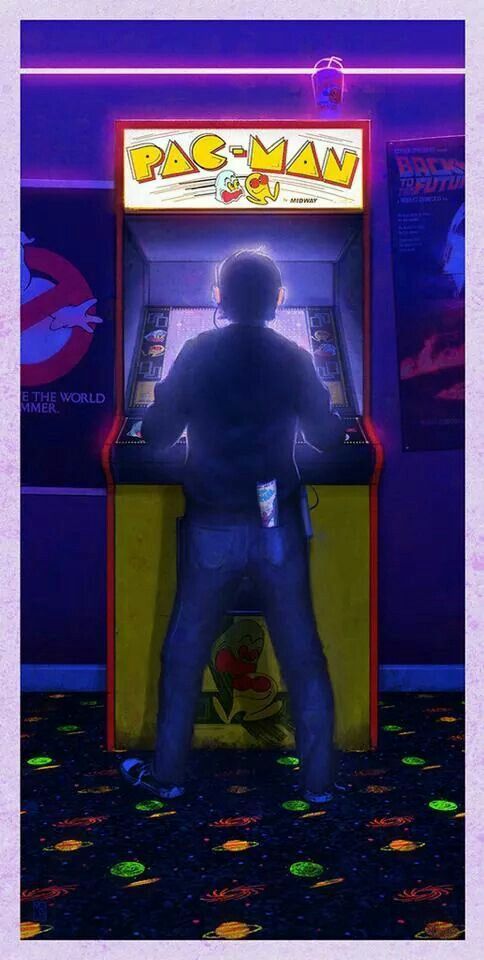"High Score" by Matthew Rabalais
Interview: Over at The Guardian, Stuart Dredge discusses Starships with Sid Meier, as well as the educational value of games. "That was the dirty little secret about our games: you actually do learn something,” he says. “Young people enjoy learning, even if they don’t necessarily enjoy being educated. There’s a lot of satisfaction in learning something, and watching your skill increase and coming to understand the map of the Caribbean or how one discovery led to another."
News: British artificial intelligence company Google DeepMind has created a program that can beat humans at Pong. The deep Q-network mastered around half of the fifty Atari 2600 games it was shown, learning how to play them from scratch rather than being programmed specifically to deal with them, as was Deep Blue with Chess.
News: Star Trek Online players gathered to pay their respects to Leonard Nimoy when they heard the news of his death. Cryptic Studios plan to add a memorial to Nimoy and Spock on March 5th.
As part of Kill Screen’s week on the first PlayStation, David Shimomura delves into the semiotics of the the PlayStation’s controller design. Shimomura writes that what Teiyu Goto, the designer of the original controller "didn’t realize was that while he had ultimate reign of the symbols themselves he did not have ultimate sanction over the meanings that others would draw from them." That right there is some serious grad thesis fodder.
Author N.K. Jemisin writes eloquently about making race matter in art, including in videogames, beyond simple nods to diversity. She discusses Vivienne in Dragon Age: Inquisition, pointing out that, “Vivienne is affiliated with many groups but few of them seem to have contributed anything to who she’s become. She’s the only playable black woman seen in the entire trilogy of games so far, and she is cultureless, rootless, and quintessentially raceless.”
Big Fat Phoenix asks if how we roleplay can change who we are. The author considers how their own relationship to roleplaying in games has changed over the years and what it reveals about their personality and morals.
CNet takes a look at the growing popularity of virtual reality in the gaming industry.
In my opinion, Darkest Dungeon is a brilliant game. Austin Walker’s thoughts on the game's sanity system may be the best response to the gothic masterpiece so far.
Here’s a piece about Anita Sarkeesian’s recent talk at NYU, with some great quotes about how she wants video games to change and grown and expand.
History Respawned is a show where historians consider historical video games - like Papers Please, Diablo III, Assassin's Creed Unity and Wolfenstein: The New Order - with host Bob Whitaker, a history PhD and professor from Dallas, Texas.
Jorge Albor at Pop Matters looks at how anarchy is represented in Netrunner and how the game’s characters and mechanics allow for the exploration of various real-world anarchist strategies and ideals.
At Kill Screen, Chris Priestman retraces the development of Lara Croft as well as the changing face of feminism through the nineties.
Lulu Blue praises Monster Hunter‘s mechanics, concluding that "So many moving parts also means there’s just as much space for creative, unexpected solutions."
Mattie Brice looks poetically and thought-provokingly at how our physical bodies are present or not when we play games. She believes that the body is marginalized in many games.
Old Game Mags is a Tumblr that looks at the way game culture was disseminated before the widespread acceptance of the net: through specialty, hobbyist print magazines. It features snapshots from the past such as the obligatory fan art pages, covers, dev interviews, reviews, advertisements, and special features. The site has fairly regular updates, and features high quality scans. The Internet Archive also offers a sizable collection of computer magazines, many of which include game coverage. The zzap bible is a searchable archive of reviews out of one of history's greatest video game magazines.
Over a series of nine blog posts (1, 2, 3, 4, 5, 6, 7, 8, 9), Jimmy Maher reviews and ruminates on Infocom's Trinity, Brian Moriarty's 1986 text adventure about the atomic bomb. Andrew Plotkin responds. And, in case you weren't keeping up with the latest computer games in 1986, Trinity is playable online at the Internet Archive, which makes me squee in delight because my parents think I needed a working computer until the early nineties. The same parents that now eat their breakfast with their laptops open in front of them.
At Play the Past, Jamie Taylor explores the relationship between history and video games, particularly the disturbing way in which history can be re-written by games.

No comments:
Post a Comment